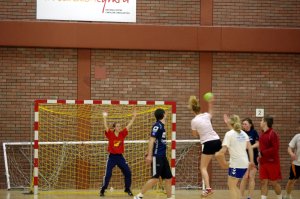Among this sport’s top club sides are Spanish rivals Barcelona, Real Madrid and Atletico Madrid, while the Hamburg-based HSV are German Bundesliga men’s champions. Indeed, the game is one of the most widely played and watched on the continent.
But this is not football. Indeed, despite the popularity of handball elsewhere in Europe remarkably few people in this country have even heard of it – just nine months before London welcomes the world’s top players for the 2012 Olympic Games.

Germany’s Toyota Handball League – the Bundesliga – is among the most watched sporting events in Europe. Picture: Flickr, kaiser_t
There are only two Welsh handball teams, giving a clear indication of the level of knowledge the vast majority of people in this country have of the game. The men’s section of the Cardiff handball club, the first one set up in Wales, has even had to enter competitions jointly with Bath.
Similar in concept to football, handball is played on indoor courts by teams of seven, which includes a goalkeeper. Players throw a small ball between each other before attempting to score from outside the keeper’s D-shaped goal area.
It made its Olympic debut in 1936, but has never caught on over here. Only four of the 20 members of the Cardiff squad – both men and women – are British. Many are Erasmus students based in the city, the majority from France and Germany.
Marie-Laure Chevalier, President of the Cardiff Handball Club, is hopeful the exposure offered by the Olympics will open up the sport to a wider range of potential players. “One of the main problems at the moment is that many Britons do not know what handball is,” she reveals.
It has been a tough sell so far, but that is hardly surprising.
Apart from Eurosport, the exposure here is minimal, and it comes as a surprise to many to see just how widespread it is abroad. It has been estimated, for example, that it is the second most watched sport in France – behind football, but ahead of sports including rugby union.

Cardiff’s handball club in training
“Handball in the UK is definitely building up, although there are so many people who still don’t know what it is exactly,” says Benjamin Tsui Chun Man, a student at UWC Atlantic College in Llantwit Major. “I think the challenge would be to get people’s interest in the first place.
“I tried to introduce handball at my school but it just didn’t work out due to a limited amount of resources, like a suitable indoor court.”
As with a number of similarly low-profile sports, the impact of next year’s games is seen as crucial.
“The 2012 Olympics definitely bring huge exposure of handball to the UK audience,” he adds. “I hope the Olympics could make handball more popular and raise people’s interest.
“There is such a big opportunity here with the UK’s location next to all the countries that are good at handball, like France. The UK has a great potential to make this sport as popular as the Germans’ handball league – if it was organised well.”
But there has never been much of a handball infrastructure in this country.
The Great Britain men’s team was not formed until 2005 and since then has hardly had an illustrious record. Earlier this month, they were defeated 29-20 in Israel, making qualification for the 2013 European Championships almost impossible.
As is crucial for minority sports such as handball, an aggressive recruiting campaign is waged by the club.
“We try and attract new players by displaying posters in Cardiff and by posting messages on Gumtree,” explains Chevalier, referring to the widely used classifieds website.
An efficient Facebook page and website are also run, but there is a frequent struggle for numbers.
“We occasionally have a shortage of players for training – and for matches. We always need to recruit new players as most of our club members are only here for a short period of time as students or for a gap year,” says Chevalier.
Chevalier also bemoans the lack of opposition available. Cardiff’s senior men’s team – jointly with Bath – compete in a division within the South Development League alongside teams from Southampton, Bristol and Bournemouth (the Anglo-European College of Chiropractic). Fixtures take place every month in Wellington, Somerset with two matches played on each occasion.
But Cardiff’s women’s team does not even play competitively, due to an almost total lack of (relatively) local opposition. Handball is a long way from taking root in the UK – and the problem is in even more acute in Wales, although Bangor University is attempting to begin its own team this year.
Much hinges on the reaction of the British public to the Olympics and although there is little chance of a heroic medal for Team GB, the chance to watch the best in the business might help spark what has so far been the incredibly slow-burning development of handball in the UK.
“Most of the players in our club are from all over [mainland] Europe,” Chevalier emphasises. “We are very keen to see more British players joining our club.”
There can be no better advertisement for the likes of the Cardiff handball club than that fortnight in August 2012.
**More information on Bangor University’s fledgling handball club can be found on Facebook, either here or here.
**The next major handball tournament will be the 2012 EHF European Men’s Championships. The 10th edition of this tournament will take place in Serbia from January 15-29.






